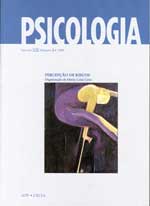Love and perceived invulnerability towards AIDS
DOI:
https://doi.org/10.17575/rpsicol.v12i1.572Keywords:
-Abstract
Aimed to show the importance of social and cognitive factors to understand the underestimation of AIDS risk. The main goal of this research was to establish the determinants of perceived invulnerability to this disease, considering 3 levels of analysis: an individual level based on the Cognitive Adaptation Theory (S. Taylor and J. Brown, 1988), an inter-personal level based on R. Sternberg's Theory of Love (1984) and a inter-group level based on Social Identity Theory (H. Tajfel, 1984). 362 university students answered a structured survey. Results show that although interpersonal variables, specifically optimism about their partner, was the best predictor of perceived invulnerability to AIDS, all the other levels significantly contribute to the explanation of that variation.


